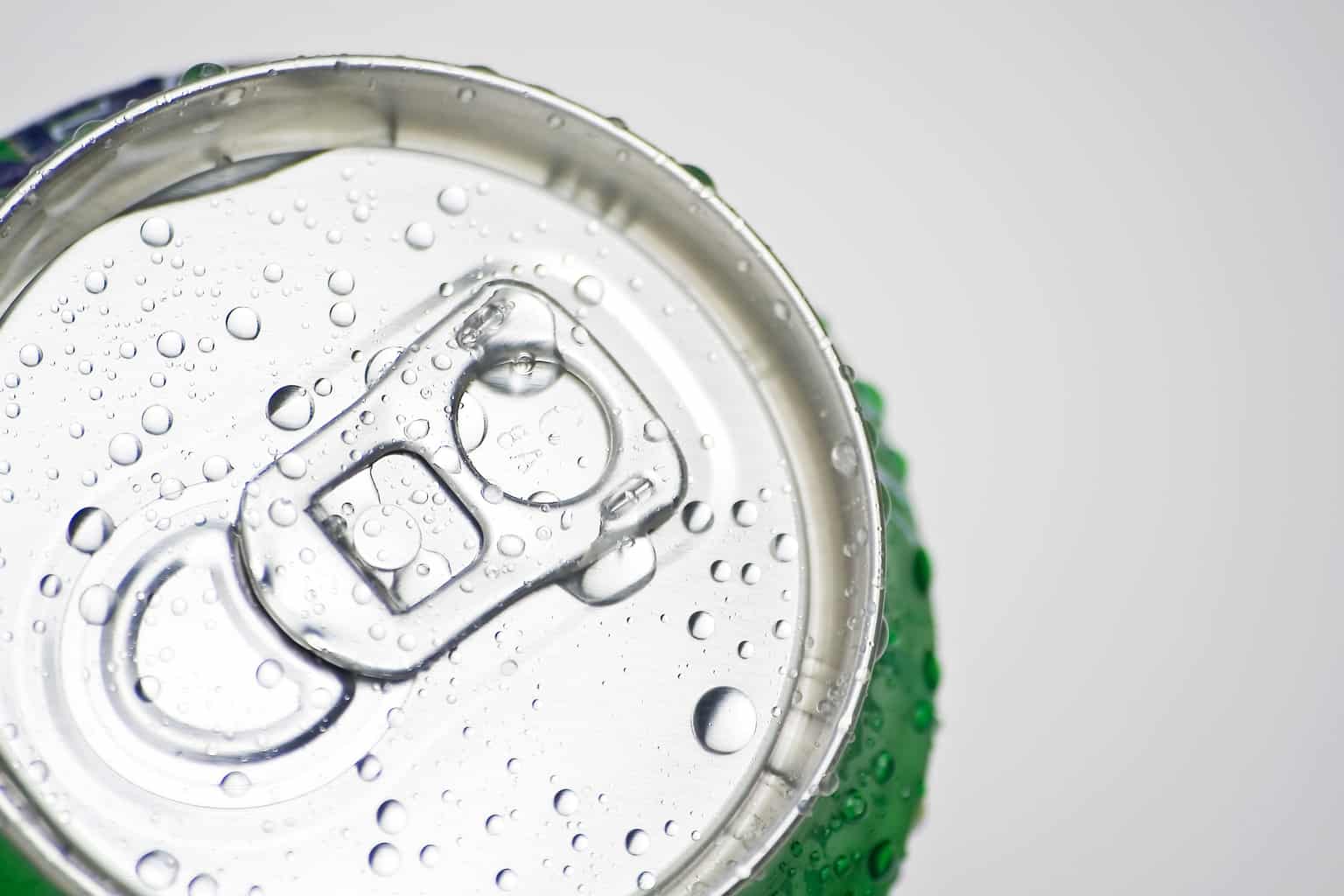
[cmamad id=”17624″ align=”center” tabid=”display-desktop” mobid=”display-desktop” stg=””]
Is regular soda a much healthier and safer option?
—-Important Message—-
My blood pressure doctor freaked out…”Sit down,” my doctor said, “We need to talk.”
I had high blood pressure for years and I was trying to get it down on my own…
I tried different diets and supplements, but nothing seemed to work.
And then one day I felt tired and dizzy with low energy. My legs felt like rubber. Even getting out of bed was difficult.
What if this was the beginning of a stroke? Or a heart attack?
Filled with dread, I made an emergency appointment with the doctor.
Maybe my stupid attempts to fix my own blood pressure will send me to an early grave, I thought…
This time, the doctor himself took my blood pressure. Then he took it again.
Was he finding something terribly wrong with me?
I put my head in my hands. None of my blood pressure fixes had done any good.
“What have you been doing differently?” the doc asked. I told him.
He said, “Whatever it is you’re doing, keep doing it. But I’m worried…”
“Now your blood pressure is TOO LOW. I’ve never seen blood pressure drop like this. Let’s stop the blood pressure medication altogether. Stop taking what I gave you. Now.”
The next day, I felt better than I had in a long, long time.
No more Big Pharma treatments. And my blood pressure was normal for the first time in years.
In fact, from that day forward I never had to take anything for my blood pressure.

——-
Diet soda’s worst fear
Of all the food additives currently in use, none has a more controversial history than aspartame.
In the 1970s, aspartame was a banned substance.
It took the combined actions of scientific data manipulation and the political clout of Donald Rumsfeld – the new CEO of Searle at the time – to finally get it approved.
Aspartame was initially barred from use with maximum prejudice by the FDA after a widely publicized scandal over fraudulent data submitted by the manufacturer.
So egregious were the acts of scientific fraud that had been uncovered and published in the Bressler report…
…the FDA formally petitioned the US Attorney General for Searle’s prosecution.
[cmamad id=”17625″ align=”center” tabid=”display-desktop” mobid=”display-desktop” stg=””]
This was the first time in history that the FDA requested a criminal investigation of a manufacturer.
“Most of our dosage calculations differed from Searle’s dosage calculations by 10 or more mg., when the dosage is expressed as mg/kg/day.” –The Bressler Report
Although migraines are seen as a minor side effect by most, aspartame-induced headaches reveal a larger problem.
This also highlights Searle’s capacity for ongoing scientific fraud.
That is…
Monsanto’s capacity to perpetually influence scientific literature in its favor.
Monsanto bought Searle (the company that originally patented aspartame) in 1985.
Historically, whenever a toxicity issue concerning aspartame attracted public scrutiny, a NutraSweet-funded publication miraculously appeared in the literature.
(NutraSweet is the original brand name of aspartame.)
The corporate studies always conclude there to be “absolutely no effect.”
Yet these studies are always in contrast to studies that are funded independently.
Aspartame is a methylated dipeptide of phenylalanine and aspartic acid.
As such, there are four primary concerns surrounding aspartame:
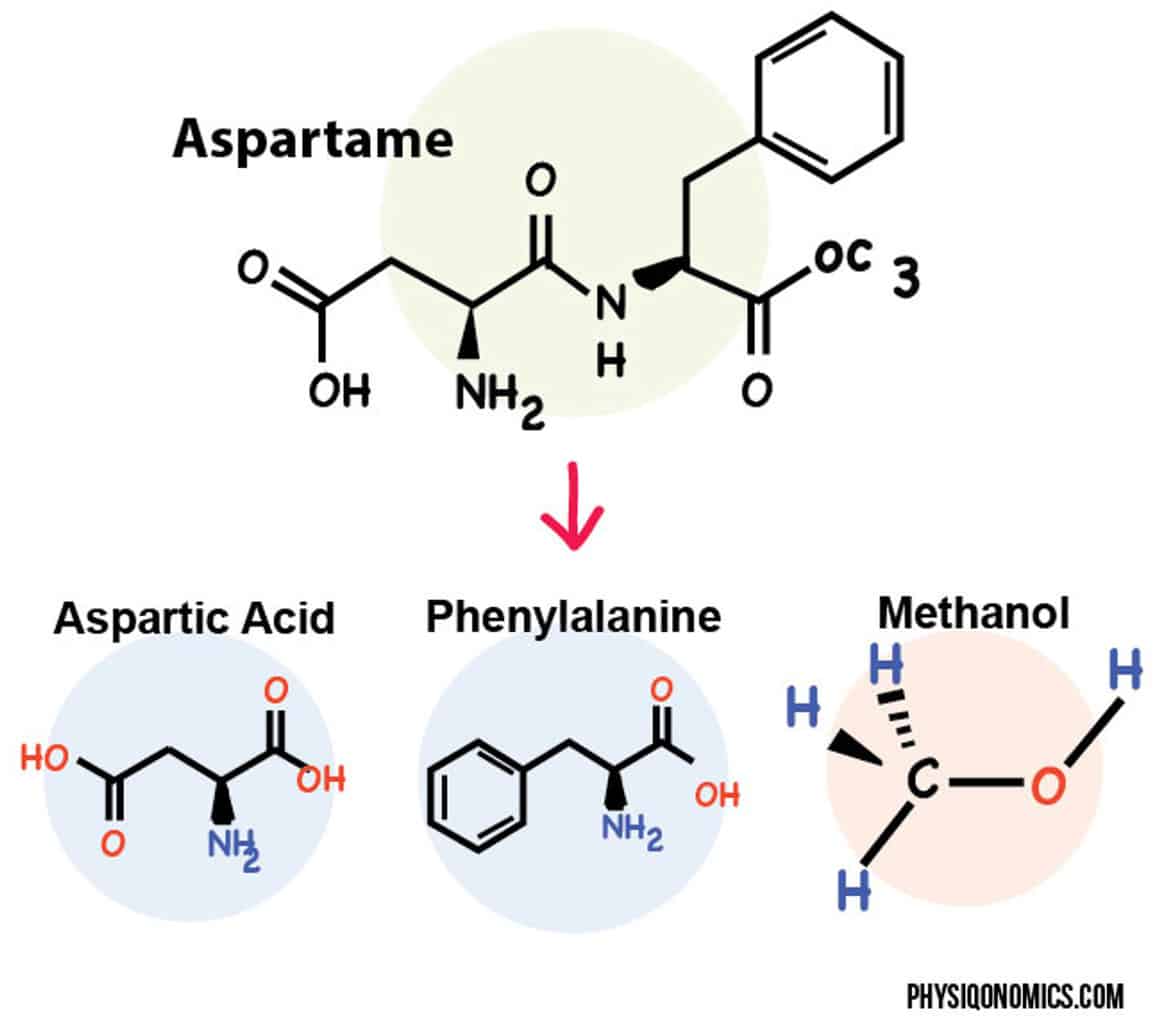
Aspartame can increase plasma concentrations of (1) aspartic acid, (2) phenylalanine, and (3) methanol.
And there’s also some concern surrounding its (4) diketohydrazine cyclization product: diketone hydrazine cyclization
Out of all aspartame’s metabolites, methanol is the most blatant toxin.
While it’s true that plasma methanol will reliably increase after aspartame ingestion, it’s actually the phenylalanine metabolite that attracts more attention.
Methanol is certainly not specific to aspartame. And can be increased through a variety of foods and drinks.
Methanol can be released by pectin (i.e. from apples), and small increases are not usually a huge problem in people with adequate folate intake.
And, although aspartate is an excitotoxin at massive concentrations, most of this will be converted into alanine in the intestines.
Should this transformation fail to occur, for whatever reason, aspartate cannot cross the blood-brain barrier. So it is of less concern.
And the foreign-sounding diketohydrazines are actually formed naturally in the body, and by a few different amino acids.
Yet the phenylalanine spike is a big problem…
It can logically be expected to reduce brain function in levels relevant to chronic diet soda ingestion.
Phenylalanine can be decarboxylated into phenylethylamine in the body. And that is a confirmed migraine trigger in people with low monoamine oxidase activity.

Phenylethylamine is one of the molecules found in cheese, chocolate, and wine that induces migraines.
This is similar to tyramine, also a trigger. But phenylethylamine is even more potent.
Aspartame’s capacity to induce migraines was poised to become common knowledge in the 1980s…
Just when a NutraSweet-funded article “debunking” the association conveniently materialized in the prestigious New England Medical Journal.
No doubt, this article assured many doctors that there is no relation between aspartame and migraines – and also that patients saying the opposite were “simply deluding themselves.”
Yet the science is clear: Aspartame has been widely reported to cause headaches. And it is still widely reported to cause headaches.
It is actually chemically expected to cause headaches.
It has reliably caused headaches in every study not funded by one of its producers:

A case report published in The New England Medical Journal popularized the migraine connection just a few years after aspartame was approved for use in soft drinks in 1983.
This aspartame victim had consistently experienced throbbing headaches every time she had a few cans of Diet Coke®.
The editor actually forwarded the report to NutraSweet before publishing it.
The company responded by recommending, “the study be repeated with the sweeteners administered in capsules” – of their making.
No doubt because they knew this would mitigate the headache reaction.
The company-supplied aspartame capsules, besides being time-release, would likely be consumed with food – so that other amino acids present would dilute the phenylalanine.
Such capsules were given in the NutraSweet-funded study published one year later in the very same journal:

This was a unique study:
Forty subjects who had previously filed a headache complaint with NutraSweet congregated at Duke University in 1987.
The travel expenses of the subjects must have been funded by NutraSweet, as they’d come from 25 different states and it seems they were also busy people:
Only one unemployed person was among the subject group, which was otherwise composed of bankers, a waitress, a statistician, two students, a machinist, some teachers, a graphics designer, an accountant, salesmen, a pianist, etc…

Thirty-five percent of those who had been given aspartame capsules reported a headache.
And yet, bizarrely, 45% of those taking placebo reported a headache.
The aspartame capsules had been verified as containing aspartame…
Yet no analysis of the placebo capsules was offered in the report.
Judging by the response, you’d have to assume they contained even more aspartame, or perhaps some additive such as tyramine or phenylethylamine.
Because, really, headache is the most common complaint with aspartame use.
It’s actually the additive with the most FDA complaints (Bradstock, 1986).
It is completely unimaginable that so many people would get headaches from placebo.
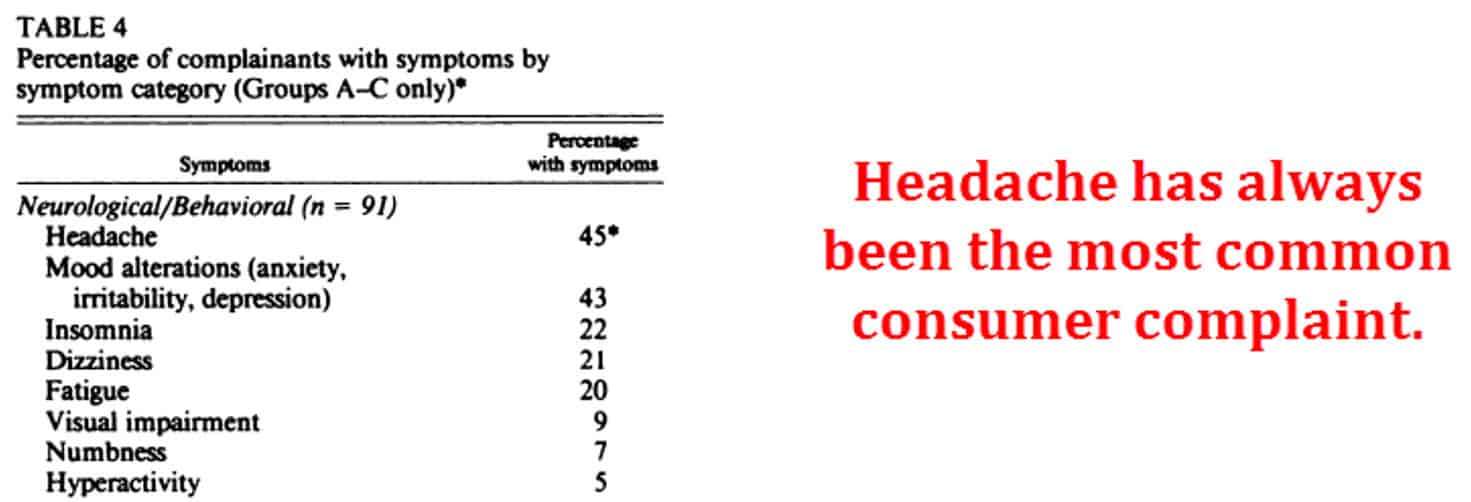
The aspartame/headache association is a very consistent one.
And just a few days after that study was published, another aspartame/migraine study was submitted to the journal Headache showing the opposite (yet expected) results.
Unlike the NutraSweet-funded study, this one was independent.
This study was conducted by a student in Florida as partial fulfillment of a Master’s Degree:

Like the previous study, this one had a crossover design: Subjects took aspartame for one week while keeping records of their food intake…
And the same subjects took a placebo during a different week.
Not surprisingly, a significant increase in headache frequency was observed in subjects when taking aspartame:
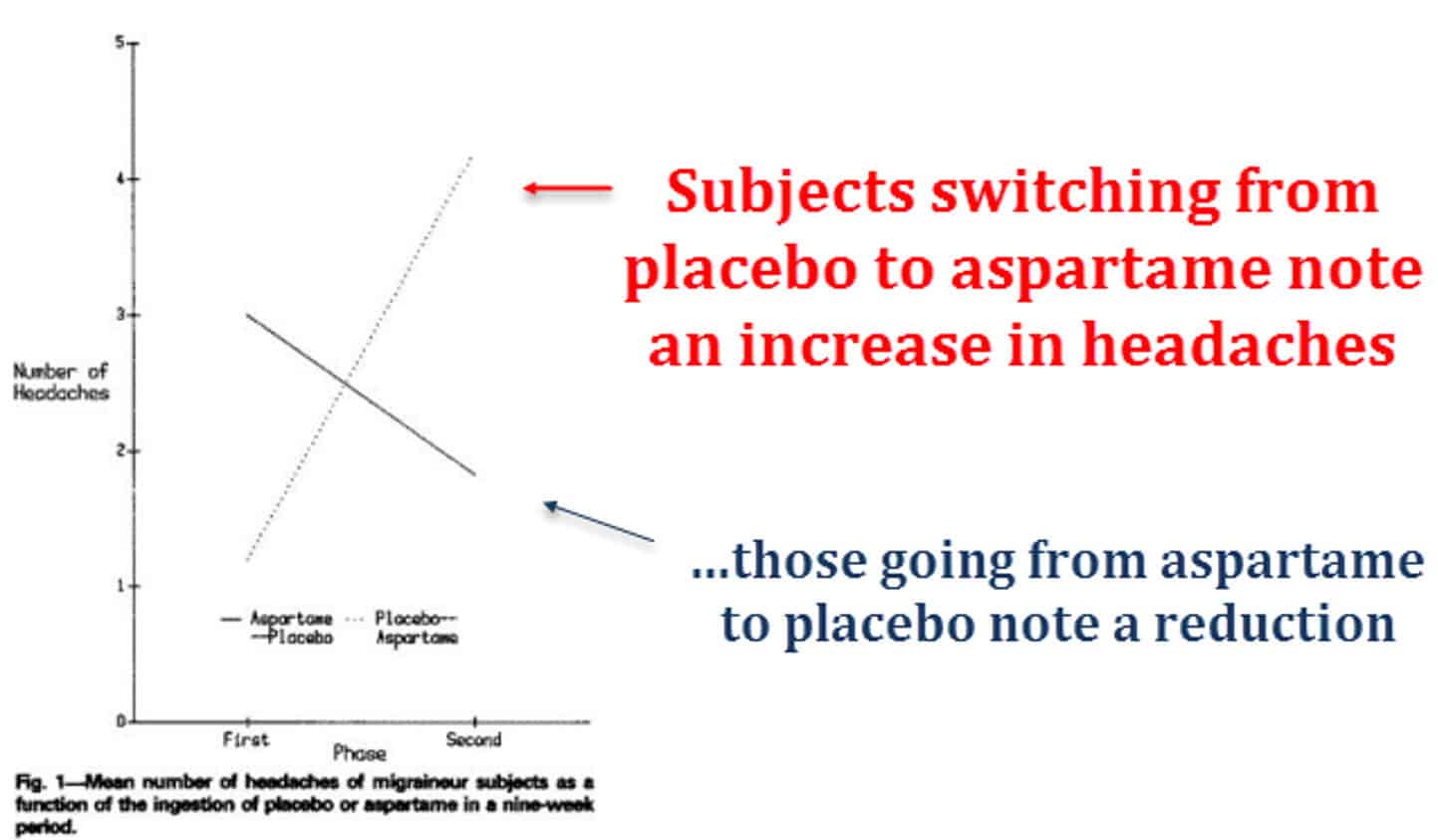
This was a much longer and more realistic study but, unfortunately, it was published in a lower-impact journal.
The next headache/aspartame study to be published also showed a positive association between aspartame and headache.
Two more detailed case reports followed.
Migraines are actually expected to occur in a minority of people taking aspartame because of the phenylethylamine formed.
“It is now well known that phenethylamine derivatives including tyramine, dopamine, and norepinephrine cause a marked increase in blood pressure when injected intravenously into mammals.”
In people with a low activity of monoamine oxidase – the enzyme that nullifies it – eating foods with phenylethylamine can increase blood pressure and trigger migraines.
Although tyramine (found in cheese and wine) usually gets more attention as a headache-inducing food factor, many foods also contain phenylethylamine, which is very similar.
“Phenethylamine has been implicated in the onset of migraine headache attacks.”
This has been shown to occur, and more often in patients who have low monoamine oxidase activity:

Although the tyramine in cheese is the stereotypical migraine trigger, chocolate has actually been found to cause more food-induced migraines.
Chocolate does not even contain tyramine, yet it contains considerable amounts of phenylethylamine.
Phenylethylamine has also been shown to cause headaches in people with low monoamine oxidase activity.
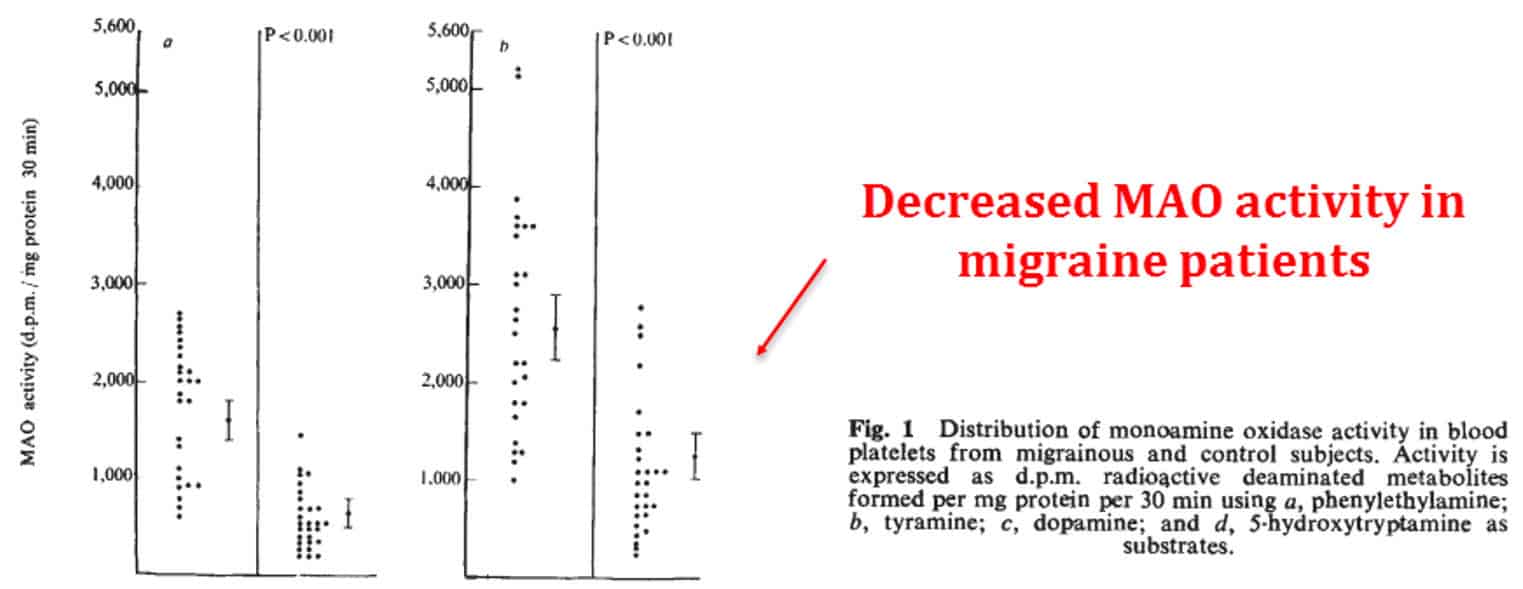
Should one of these people ingest aspartame, you could bet they would get a headache – and you would probably win that bet.
Although headaches may seem like a minor nuisance with an easy fix, the fact that Monsanto is obviously shaping public opinion by distorting science has far-reaching consequences.
If they’d go to these lengths to deny something as simple as headaches…just imagine what’s going on in the fields of pesticides and GMO science.
The analogous NutraSweet-funded studies can be found in other areas of aspartame research:
…children with hyperactivity, pilots with seizures, and seniors with Parkinson’s disease.
Although many medical doctors are probably assuaged by all of this, the more knowledgeable scientists aren’t so easily fooled.
Career brain and amino acid scientist Richard Wurtman from MIT knows that aspartame will lower brain dopamine, methionine, and serotonin through competition.
Rats metabolize phenylalanine 6x faster and, hence, are poor models for aspartame research.
A reduction of brain methionine should reduce brain protein synthesis.
Maybe that is why people with hyperphenylalaninemia (i.e., chronically high phenylalanine) have such low IQs.
High phenylalanine also leads to reduced brain myelination.
If not for the methanol, aspartame should probably be avoided for the phenylalanine alone.
Though certainly not a death sentence if used occasionally, it seems prudent not to get into the habit of drinking beverages containing aspartame.
You might be even tempted to avoid it entirely if for no other reason than to spite Monsanto.
—-Important Message—-
Drink sugary sodas and fix diabetes? Huh? Here’s the full story that will shock you about sugar’s role in FIXING diabetes…
High blood sugar does not cause diabetes.
High blood sugar is the result of having diabetes, not the cause of diabetes.
It’s like seeing a house on fire. Whenever you see a house on fire, you see fire trucks. But we know firefighters put the fires OUT…
It’s the same with high blood sugar.
High blood sugar is actually a way for the body to DEAL WITH diabetes, to PUT OUT the internal “fires” from diabetes…
High blood sugar itself is a SYMPTOM of diabetes…
And that’s why lowering blood sugar with pills is almost never a good idea.
Instead, we need to be getting rid of the CAUSE of diabetes…

Here’s how to fix the CAUSE of diabetes so you don’t need pills any more
—


Leave a Reply